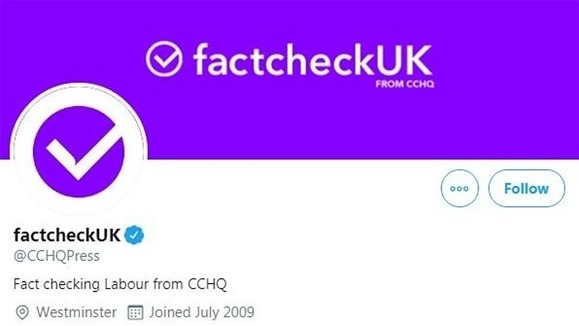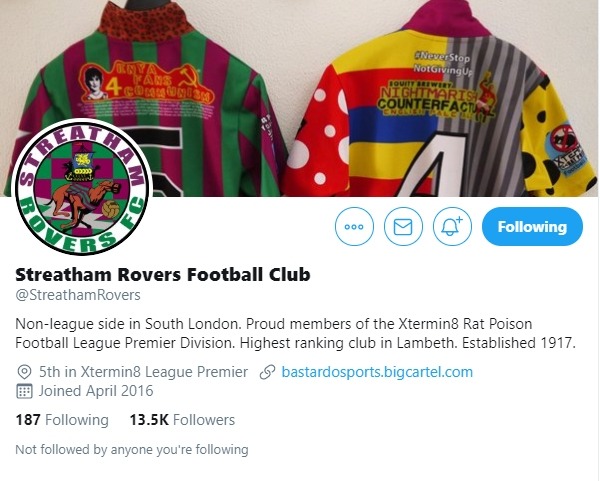Caught up during the UK election in a purge of parody Twitter accounts, a surreal project that tows the line between social media trolling and performance art is exposing some serious hypocrisy on the platform.
The Streatham Rovers are like any other small South London non-league football club. Their garish green and purple jerseys are emblazoned with the logo of their sponsor – a shady Russian public relations firm called the Internet Research Agency (IRA). The Greyhounds, as they’re colloquially known, have a supporters’ association called the Streatham Hardline Independent Trust (or SHIT), a group of self-described ‘anarchists’ who believe that their club is supported unconditionally by the spirit of Karl Marx.
They have a fierce rivalry with Dynamo Catford (another South London team) in the Xtermin8 Rat Poison Football League, whilst their club motto, #NeverStopNotGivingUp, epitomises their attitude towards the game.
By this point it may be apparent that The Streatham Rovers are not like any other small South London non-league football club because the Streatham Rovers don’t exist. This fact caused a mild amount of embarrassment for the BBC when their satirical news show Have I Got News For You broadcast a segment about a controversy between the Streatham Rovers and the equally fictional Sydenham FC, who, the Rovers claimed, had wilfully arranged their player’s names on the schedule for an upcoming game to spell out: SRFC ARE SHIT.
The volunteers who run this account have long dreamed that our beloved club #SRFC would one glorious day go on an FA Cup run and maybe even appear on the BBC. Instead we get vile mockery on Have I Got News For You on prime time BBC1. Absolutely heartbreaking. Painful. Agonising. pic.twitter.com/zgKoZa6I8b
— Streatham Rovers Football Club (@StreathamRovers) April 12, 2019
The Rovers are the brainchild of a demented Twitter mastermind who goes by the alias Trevor Bastard, and over time they’ve come to form the central node of an elaborate comic world called the Trevor Bastard Extended Universe. The TBEU encompasses not only other fictional non-league teams, but also SRFC’s lawyer, a divorce solicitor named Oliver Laughdugry (a man who is so anti-Brexit that he had his pet dog put down to protest it full time, a ‘tragedy’ he blames on former Labour leader Jeremy Corbyn), the club’s inept manager Taff Goose, who is constantly fighting off rumours that he faked his own death, and a protest group called Enya Fans for Communism that frequently hijacks the SRFC account.
I AM NOT DEAD I AM NOT DEAD I AM NOT DEAD I AM NOT DEAD I AM NOT DEAD I AM NOT DEAD I AM NOT DEAD I AM NOT DEAD I AM NOT DEAD I AM NOT DEAD I AM NOT DEAD I AM NOT DEAD I AM NOT DEAD I AM NOT DEAD I AM NOT DEAD I AM NOT DEAD I AM NOT DEAD I AM NOT DEAD I AM NOT DEAD I AM NOT DEAD https://t.co/XUFgVn72Dk
— Dr. Taff Goose (Doctorate in Sports Motivation) (@TaffGoose) January 14, 2020
At points the history of SRFC is elaborated on – for instance, in 1983, during an away game at Dynamo Catford a group of Streatham fans ‘got a bit carried away’ and ended up fire-bombing an orphanage, presumably igniting the rivalry (pun intended).
Today we black out the Streatham Rovers Football Club emblem as a mark of respect on this, the anniversary of an unresolved tragedy that befell our historic club.
In this thread we will detail the shocking events and explain what led to crimes that to this day remain unpunished. pic.twitter.com/TUP4M1n7QS
— Streatham Rovers Football Club (@StreathamRovers) January 14, 2020
SRFC has 33 reviews on Google, resulting in a total of 3.7 stars, with comments vaguely hinting at oddities such as the club serving hedgehog meat in their burgers, playing Enya during halftime breaks, and a history of ‘unfortunate deaths’ associated with the club. According to the clubs Tweet history, past matches have been delayed due to malfunctioning VR headsets, the death of the club chickens after they were spray-painted in the team’s colours, and a robot on a murderous rampage at their kit launch.
Various personalities representing the club are at times either being kidnapped, starting online anti-bullying campaigns, or running for office in obscure constituencies.
There are many layers of detail to be found in this fever dream, and it seems to have tickled the funny bone of Twitter users, with the club boasting 13.5K followers. The satirical creation, whilst predominantly poking fun at loutish stereotypes associated with minor league football, can also be understood as a form of all-encompassing performance art (they have a word for this in German – Gesamtkunstwerk). The disparate elements of blog posts, spoof podcasts, fake newspaper columns, and low-production videos all coalesce in Twitter, and this allows it to occasionally leak into the real world.
This was perhaps best exemplified by a bizarre interaction with London mayoral candidate Rory Stewart in October last year, who pledged to help the club with a ‘dog muck issue’ outside their ground before realising he’d been had.





















